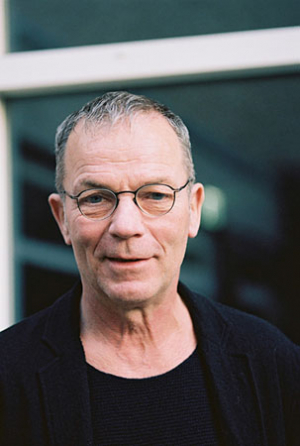Gallery
All Pictures (3)Biography
Thomas Heise was born on 22 August 1955 in East Berlin (then GDR) as the son of the renowned professor of philosophy Wolfgang Heise. After an apprenticeship as a printer (1971 to 1973) and 18 months of military service in the National People's Army, he worked as an assistant director in the DEFA Studio for Feature Films from 1975. In this function he was involved in Wolfgang Hübner's "Der Meisterdieb" (1978) and Heiner Carow's "Bis dass der Tod euch scheidet" ("Until Death Do Us Part", 1978), among others. At the same time, he caught up on his A-levels at night school.
In 1978 Heise began studying directing at the Konrad Wolf Academy of Film and Television in Potsdam-Babelsberg (today: Film University Babelsberg). There he soon came into conflict with censorship: His short documentary "Wozu denn über diese Leute einen Film?" ("Why Make a Film About People Like Them?", GDR 1980), about the everyday life of two young petty criminals, was immediately banned from being shown. In 1982 Heise dropped out of university and began working as a freelance author and director in the fields of theatre, radio plays and documentaries. Among other things, he made documentaries for the State Film Documentation of the GDR with "Das Haus" (1984) and "Volkspolizei" (1985); these were not intended for the contemporary GDR audience, but for later generations, and were supposed to give an unembellished and uncensored view of everyday life in the GDR.
Until the end of the GDR, Heise also worked on his own projects, but these were blocked, confiscated or destroyed by 'operative means'. During these years, Heise also began initial research for later films, such as "Eisenzeit" and "Vaterland" ("Fatherland"). He found an artistic home in the GDR at the theatre, especially at the Berliner Ensemble, where he worked closely with Heiner Müller. From 1987 to 1990 he also completed his master's degree at the Berlin Academy of Arts, where he was a master student of Gerhard Scheumann.
During this time Heise produced the radio feature "Widerstand und Anpassung – Überlebensstrategie. Erinnerungen eines Mannes an das Lager Dachau" (1987); the basis for this were discussions with the actor and concentration camp survivor Erwin Geschonneck, one of the great acting stars of the GDR. But once again Heise came into conflict with GDR censorship - despite Geschonneck's personal commitment, the feature ended up in the archives for political reasons. It wasn't until early December 1989, four weeks after the fall of the Wall, that the feature was finally broadcast by Berliner Rundfunk.
The big breakthrough as a filmmaker came for Thomas Heise only after the fall of the Berlin Wall and the end of the GDR. His highly controversial documentary film "Stau - Jetzt geht's los" (1992) about the radical right-wing youth scene in Halle an der Saale won the main prize at the Duisburg Documentary Film Festival and was awarded the German Film Critics' Prize; the film also received the 1st Prize of the Dutch Television Academy and the 1st Prize of the Danish Film Institute. "Barluschke" (1997), about Berthold Barluschke, who was first a stooge of the Stasi and then of the BND, received the Silver Dove at the DOK Festival Leipzig.
In his other works, Heise also dealt with social aspects in the former GDR and German-German relations, exploring topics such as privatization, reorganization of the industrial environment, unemployment and right-wing radicalism. Parallel to his film work, he was active as a director at the Berliner Ensemble until 1998.
For "Neustadt. (Stau - der Stand der Dinge)" ("Neustadt (New Town): The State of Things", 2000), in which he once again visited right-wing extremist youths and their families in Halle Neustadt, Heise received the German Film Critics' Award for Best Documentary Film. In 2002 he was awarded the Prize for the Promotion of German Film Art by the DEFA Foundation. "Vaterland" ("Fatherland", 2002), a portrait of the Saxony-Anhalt village of Straguth, where Heise's father was a prisoner during the war, was awarded the Silver Dove at the Festival Dok Leipzig and won the SRG SSR idée suisse prize at the Festival Visions du Réel in Nyon (Switzerland). "Mein Bruder. We'll Meet Again", a portrait of his brother who lives in France, was shown in the Forum of the Berlinale 2005. He received a third Silver Dove for "Kinder. Wie die Zeit vergeht" (2007), his third documentary film about the people of Saxony-Anhalt after reunification. The film also received a nomination for the European Film Prize.
The Forum of the Berlinale 2009 saw the premiere of "Material", a collection of observations and fragmentary documentary scenes recorded between 1988 in the GDR and 2008 in Germany. In a sense, "Material" marked the end of a creative period, as Heise very clearly expanded his range of themes in his subsequent films: "Sonnensystem" ("Solar System", 2011) portrays the life of an indigenous community in the mountains of northern Argentina threatened by extinction; "Gegenwart" ("Consequence", 2012) describes daily procedures in a crematorium between Christmas Eve and New Year; "Die Lage" ("Condition", 2012), documents the visit of Pope Benedict XVI. in Germany; "Städtebewohner" (2014) shows the everyday life of young prisoners in Mexico City.
With "Heimat ist ein Raum aus Zeit" ("Heimat is a Space in Time"), Heise once again made a very personal film: Using documents from his private archive, he traces the history of his family over four generations between Vienna, Dresden and (East) Berlin. The film premiered in the Forum of the Berlinale 2019 and was awarded the Caligari Film Prize.
From the winter semester 2007/08 to the summer semester 2013 Thomas Heise was professor for film at the Hochschule für Gestaltung in Karlsruhe. Since then he has been Professor of Art and Film at the Academy of Fine Arts Vienna.
